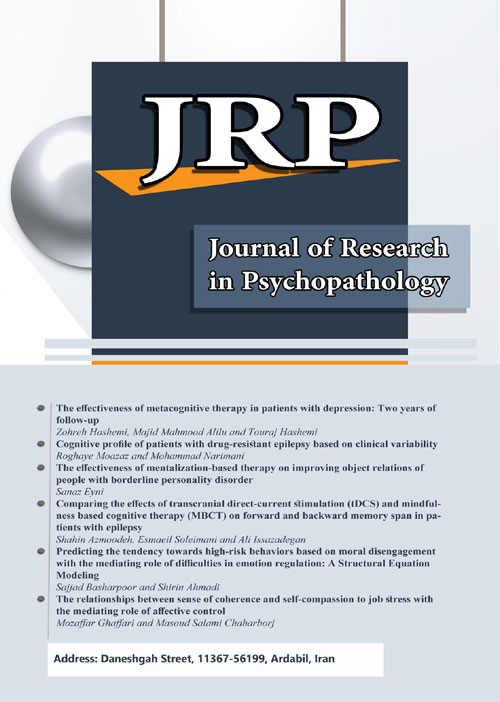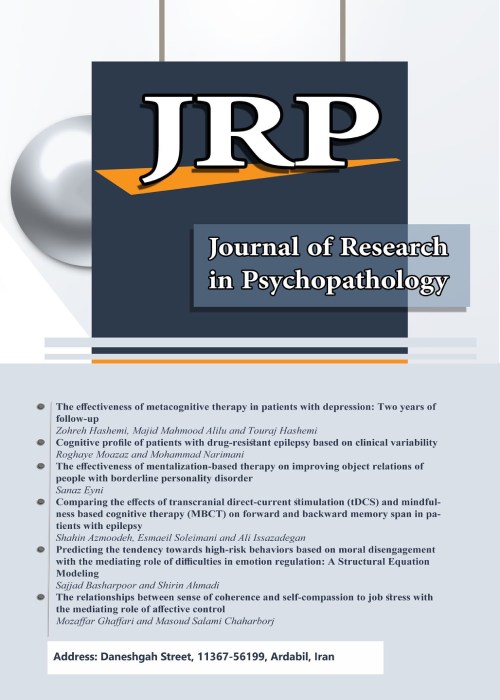فهرست مطالب

Journal of Research in Psychopathology
Volume:2 Issue: 5, Summer 2021
- تاریخ انتشار: 1400/10/13
- تعداد عناوین: 6
-
-
Pages 1-7The aim of this study was to examine the role of sensory processing sensitivity and emotional processing in predicting psychological disturbances in drug-dependent individuals. The method was descriptive-correlational where the population included all male drug abusers in Tabriz city. The sample consisted of 290 individuals who were selected by cluster sampling. The data were collected using Highly Sensitive Person Scale (HSPS), Emotional Processing Scale (EPS) and Kesler Psychological Distress Scale (K-10) and were analyzed using Pearson correlation coefficient and multiple regression analysis. The results revealed that sensory processing sensitivity and emotional processing had a positive relationship with psychological disturbances (p < .01). Also, the results of multiple regression analysis showed that sensory processing sensitivity and emotional processing can significantly predict 40 percent of psychological disturbances variance (p < .01). In accordance with current findings, it seems that sensory processing sensitivity and inefficient emotional processing are the antecedents of psychological disturbances in drug-dependent individuals.Keywords: Sensory sensitivity, sensory processing disorder, emotional processing, Psychological disturbances Addiction
-
Pages 8-14Borderline personality disorder is the most common personality disorder which is known by a variety of dysregulations in cognitive, behavioral, emotional and interpersonal relationships. The main characteristic of borderline personality disorder is emotional instability. In predicting the characteristics of borderline personality disorder many factors play a role. The aim of this study was to investigate the role of emotional schemas in predicting features of borderline personality. The present study was a descriptive-correlational one in which 462 was selected through availability sampling. To collect the data, Borderline Personality Scale (STB) and Emotional Schemas (LESS-II) were used. Also, stepwise multivariate correlation and regression methods were used to analyze the data. The results revealed that emotional schemas of control, blame, comprehension, agreement, extreme rationality, mental rumination, duration and validation predict changes in borderline personality traits. These results have practical implications in preventing the symptoms of this disorder as well as performing clinical interventions in the field of emotional schema therapy for patients with borderline personality disorder.Keywords: Borderline personality, Emotional schema, rumination
-
Pages 15-20Borderline personality disorder is a common and debilitating psychiatric disorder characterized by underlying disorders and dysfunction. Dialectical behavioral therapy has been developed to help borderline patients who have been introduced to the second level of treatment, intensive outpatient therapy with behavioral changes. The aim of this study was to evaluate the effectiveness of dialectical behavior therapy in reducing the morbid symptoms of patients with borderline personality disorder based on the three-factor theory of morbid symptoms. In this experimental study, 20 men with borderline personality disorder who were selected by availability sampling method were randomly assigned to experimental and control groups. After taking the pre-test, the participants in the experimental group underwent a course of dialectical behavior therapy, then the post-test was taken by both groups. After two months, a follow-up evaluation was performed. In all three stages, the severity index of borderline personality disorder was measured. The results of the study confirmed the effectiveness of dialectical behavior therapy on the three factors of borderline personality disorder (impaired communication, emotional dysregulation, and behavioral dysregulation) in both the post-test and follow-up stages (p ≤ .001).Keywords: Borderline personality, Dialectical Behavior Therapy, Pathological symptoms
-
Pages 22-29The coronavirus pandemic has caused crises affecting the mental health of the people. In addition, in any social crisis, people often seek out information about the event to be aware of what is happening. The aim of this study is the comparison of mental health problems according to the type of social media exposure and also the duration of its use at the time of corona pandemic. The population of the study was all men and women ranging from 15 to 60 years old in the whole country who participated in the study voluntarily and included a total of 656 participants. To this aim, Mental Health Questionnaire, the Psychological Well-Being Scale, the Impact of Event Scale, the Yale-Brown OCD Scale, and the researcher-made questionnaire on the duration and source of social media were employed. The type of media that people used to follow the news showed a significant difference on psychological well-being, impact of event, anxiety and depression. On the other hand, follow-up time can cause differences in anxiety, stress and psychological well-being between groups. The interaction between duration factor and source type only caused differences in depression, anxiety, and psychological well-being. It should be noted that the prevalence of mental disorders does not show a significant difference, except for stress, which shows a doubling of growth. The interaction of the type of media and the duration of following the news from those media can cause mental health problems and reduce psychological well-being because unreliable social media creates a lot of ambiguity that increases anxiety and stress and the impact of events such as corona pandemic.Keywords: anxiety, Corona, depression, psychological well-being
-
Pages 30-34The purpose of the present study was to investigate the effectiveness of dialectical behavioral therapy on increasing academic self-esteem and decreasing the test anxiety among female school students in Tabriz. Test anxiety threatens students' mental health and impacts their efficiency, flourishing, personality development and social identity. Using one-step randomized cluster sampling, one of the schools was selected and Cooper self-esteem questionnaire and Smith's test anxiety scale were performed and 24 students were randomly selected who had the highest score in the anxiety test and the lowest score in self-esteem questionnaire. Eleven students were put in the experimental group and ten others in the control group. The experimental group was subjected to dialectical behavioral therapy for eight sessions. The data were analyzed using covariance and multivariate covariance. The results showed that group behavior therapy was effective in increasing academic self-esteem but in reducing the test anxiety and its components did not have a significant effect on students. The result of group therapy including dialectical behavioral therapy can increase self-esteem and reduce test anxiety.Keywords: Dialectic behavioral therapy, Academic self-esteem, test anxiety
-
Pages 35-39Hyperactivity is one of the most common problems in children. Problems with hyperactivity disorder in children with hyperactivity disorder can prevent many of their functions. This study aimed to determine the effect of play therapy based on cognitive-behavioral therapy on the rate of hyperactivity in primary school children. The research was quasi-experimental with control and experimental groups. The population included hyperactive primary school children. The participants were selected by cluster random sampling. Thirty children were selected and randomly assigned to experimental and control groups. The data were analyzed using Connors Children's Hyperactivity Scale. The experimental group was trained in eight sessions. The results showed that play therapy based on cognitive-behavioral therapy has an effect on the rate of hyperactivity as well as children’s behavior in the classroom, group participation and cooperation and attitudes toward power authorities in primary school and it improved children's performance (p<0.05).Keywords: play therapy, hyperactivity, Aggression, Children


